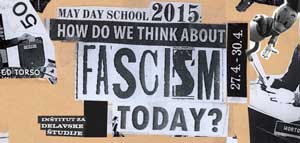Announcement by the Institute for Labour Studies (ILS), Ljubljana:
This year the annual May Day School will delve into the topic of fascism. We believe that contemporary social, political, and economic situation urges us to address this issue anew. Namely, our social context is characterized primarily by the long-term effects of the global capitalist crisis that easily rival those of the Great Depression from 1929.
Our current-day situation is, therefore, in some respects similar to the historic situation that gave birth to fascism in the first part of 20th Century. In Europe we are witnessing the electoral rise of right-wing parties with extremely reactionary, racist, xenophobic, chauvinist and anti-communist rhetoric. But the strengthening of racist and xenophobic tendencies is not limited only to rhetorical tropes of the right-wing politicians. These tendencies are institutionalized in the formal migrant and asylum policies of the EU and its member states. The implementation of austerity measures and “structural reforms” is backed up by authoritarian methods and a pretty drastic narrowing of the mechanisms of parliamentary democracy. Political decisions are becoming more and more the monopolized privilege of the narrow experts nobody voted for, while the rebelling masses of people are met with intense state repression. It is not even unusual, in such cases, for the most eminent European politicians to resort to the defamatory racist rhetoric about lazy hedonist people of the Mediterranean and to let go of our social and political rights in the name of a return to higher values. It is not unsurprising, then, that such climate gives rise and credence to parties which explicitly model their politics on historical Fascism – parties such as the Greek Golden Dawn, Hungarian Jobbik and Ukrainian Svoboda.
We would like to address the question whether any of these tendencies are evidence that our contemporary bourgeois societies are becoming fascist? Is the fascist threat today hiding in the political regimes, parties and movements that are reminiscent of historical fascism both in their symbols and rhetoric, as well as in their actions? Or is fascism to be traced to structural tendencies, contradictions and antagonisms that are at the root of contemporary capitalist societies? To properly address these questions we first have to ask what fascism even means. What is it, what are its socio-economic, political, ideological and historic characteristics? Only then can we answer the question of what is, if anything, fascist in our contemporary societies.
General overview of the conference:
– 3 keynote lectures by Mladen Dolar, Ishay Landa and G. M. Tamás.
– 5 panel discussions on the topics of fascism and liberalism, fascism and aesthetics, the class structure of fascism, fascism and right-wing politics in contemporary societies, and fascism through the lens of psychoanalysis/post-structuralism.
– 2 structured general discussions.
Speakers include: Sami Khatib, Lev Kreft, Donny Gluckstein, Tjaša Pureber, Jana Tsoneva, Anže Dolinar, Martin Hergouth, Sašo Slaček, Tibor Rutar and many others.
May Day School is hosted by the Institute for Labour Studies and financially supported by Rosa Luxemburg Foundation and transform! europe.
Contact
Institute for Labour Studies
www.delavske-studije.si
info@delavske-studije.si
Programme
For the detailed programme please click here.
